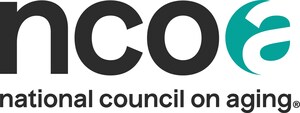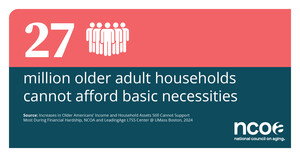Medicaid Cuts Represent an Assault on America's Most Vulnerable Seniors
WASHINGTON, April 5, 2011 /PRNewswire-USNewswire/ -- Below is a statement issued by the National Council on Aging given by Howard Bedlin, Vice President for Public Policy and Advocacy, on today's FY12 Budget Resolution proposal from House Budget Committee Chairman Paul Ryan (R-WI).
(Logo: https://photos.prnewswire.com/prnh/20100615/NCOALOGO)
NCOA recognizes the need to reduce the deficit in a balanced way, based on the principle of shared sacrifice. But for many Americans, the moral measure of our society is how we treat the least among us. The Ryan Medicaid proposal takes us from neglecting the least among us to targeting them—threatening the lives, dignity, and future of poor, vulnerable seniors, children, and people with disabilities.
These poor Americans did not create our deficit. In fact, it costs Medicaid much less than private insurance to cover people with similar health status. But these Americans in greatest need are being targeted because they don't have the voice or political power to fight back.
The Ryan budget proposal represents an assault on America's seniors on three fronts. First, it dismantles Medicare and replaces it with a voucher contribution program, designed to save money by increasing out-of-pocket costs for beneficiaries. Second, it caps discretionary spending programs which, as we have already seen in H.R. 1, would drastically cut or eliminate jobs, housing, and volunteer opportunities for older Americans in need.
I will focus today on the third front—the proposal to turn Medicaid into a block grant program and cut it by $750 billion. Let's start with five quick facts:
- Fact 1: Medicaid is America's health care safety net for poor, vulnerable seniors, children, and people with disabilities.
- Fact 2: Medicaid is the lifeblood of our nation's long-term care system. According to a report released last month by the National Health Policy Forum, Medicaid pays for about 62% of total long-term care. With nursing home care costing an average of $72,000 per year, and little or no coverage from Medicare or private insurance—it does not take long for average retirees to spend-down their hard-earned life savings onto Medicaid.
- Fact 3: Right now, about 6 million seniors need long-term care, but the demand will rapidly rise. About 10,000 baby boomers are turning 65 every day and those over age 85—who are at greatest risk of needing long-term care—comprise the nation's fastest-growing age cohort.
- Fact 4: Medicaid also pays for Medicare premiums, deductibles, or copayments for almost 5 million beneficiaries. Without these protections, these seniors could not afford Medicare.
- Fact 5: Seniors and people with disabilities make up about one-quarter of Medicaid recipients, but account for about two-thirds of its costs.
Cutting Medicaid by $750 billion and instituting a federal contribution that fails to account for changing needs, or the rapidly growing senior population, will put enormous pressure on states to reduce eligibility, cut benefits, and increase out-of-pocket costs. Medicaid recipients needing the most expensive care will be at greatest risk of being targeted for harmful cost-containment strategies.
States already have great flexibility, but must meet some long-standing federal consumer protection standards—not unreasonable when, for example, in 19 states last month, the federal government paid for 75% or more of their Medicaid costs. A block grant, however, would provide unrestrained flexibility, together with pressure from cuts, to weaken or abolish current consumer and family protections. For example:
- Nursing home quality standards could be weakened or eliminated, with dire consequences for our most frail seniors.
- Seniors could be required to pay unaffordable cost sharing and lose out on needed services.
- Current protections against spousal impoverishment could be weakened or eliminated, so spouses of those needing long-term care could be forced into poverty.
- The children of nursing home residents could be required to pay for their parents' care, or have liens placed on their homes, jeopardizing financial planning for their own retirement or their children's college costs.
What would happen if nursing home residents and their families could not afford the care, and the Medicaid safety net was no longer there to help? Could they be thrown out on the streets or have no choice but to move into their children's homes, creating enormous family caregiver burdens?
NCOA will activate its network to oppose these harmful proposals. We recently launched One Away, an innovative, national video advocacy campaign (www.OneAway.org) that gives voice to vulnerable older adults who are struggling to make ends meet in today's economy and would be severely harmed by the Ryan budget proposal. The fact is millions of seniors are just one bad break away from catastrophe. Or in this case, one bad policy away from disaster.
About NCOA
The National Council on Aging is a nonprofit service and advocacy organization headquartered in Washington, DC. NCOA is a national voice for millions of older adults—especially those who are vulnerable and disadvantaged—and the community organizations that serve them. It brings together nonprofit organizations, businesses, and government to develop creative solutions that improve the lives of all older adults. NCOA works with thousands of organizations across the country to help seniors find jobs and benefits, improve their health, live independently, and remain active in their communities. For more information, please visit: www.NCOA.org /www.facebook.com/NCOAging / www.twitter.com/NCOAging
SOURCE National Council on Aging
WANT YOUR COMPANY'S NEWS FEATURED ON PRNEWSWIRE.COM?
Newsrooms &
Influencers
Digital Media
Outlets
Journalists
Opted In






Share this article